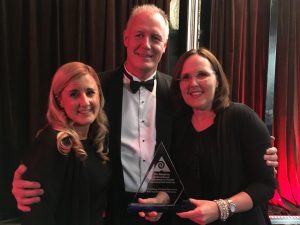RBWH doctors recognised at Asia Pacific’s premier healthcare event

Project officer Tanya Milburn, Dr John Wakefield and Professor Louise Cullen at the APAC Forum Gala Dinner in Sydney.
Two doctors from the Royal Brisbane and Women’s Hospital have won an international award for translating their research into clinical practice, enabling diagnosis of heart attacks faster and providing quicker treatment to patients presenting with chest pain in Queensland Emergency Departments (EDs).
Emergency Physician Professor Louise Cullen and Cardiologist Professor Will Parsonage received the honour for leading the Accelerated Chest Pain Risk Evaluation (ACRE) Project.
The project took home the prestigious Ko Awatea International Excellence in Health Improvement Award at the APAC Forum in early September, one of the largest healthcare improvement conferences in the world.
The project has introduced an accelerated diagnostic protocol (ADP) across the state’s EDs, which provides guidelines to safely and quickly deliver care to patients who are not suffering a heart attack.
For many people, chest pain can be a terrifying and debilitating experience. Only one in five patients with chest pain suffer a heart attack, while the rest are diagnosed with indigestion or other less serious conditions.
The innovative diagnostic tool rapidly treats patients with chest pain and has reduced the panic time and provided fast life-saving treatment to those most in need.
The ADP has redesigned the evaluation and management of low-intermediate risk patients presenting with chest pain to EDs in 19 hospitals statewide, including The Prince Charles Hospital, Caboolture and Redcliffe.
Professor Cullen said she felt honoured to receive international recognition for the project, and she hopes the ADP will become standard practice within EDs Australia-wide.
“This has reduced the demands on our emergency and inpatient services. We have been able to reassure patients that they have not suffered a heart attack sooner,” Professor Cullen said.
“We have seen a decrease in the total average emergency department length of stay by 34 minutes, which has improved each hospital’s performance against National Emergency Access Targets.”
Professor Cullen said the success of the project would not have been possible without the support of Metro North and Queensland Health.
“Translating the research into clinical practice was thanks to the enthusiasm and support of Emergency and Cardiology Department staff in the 19 ACRE hospitals,” she said.
“While a key focus was to safely improve patient care, large benefits for participating health services have also been realised.
“It has led to cost savings of more than $7.5 million dollars, money which is being reinvested in other health services.”
